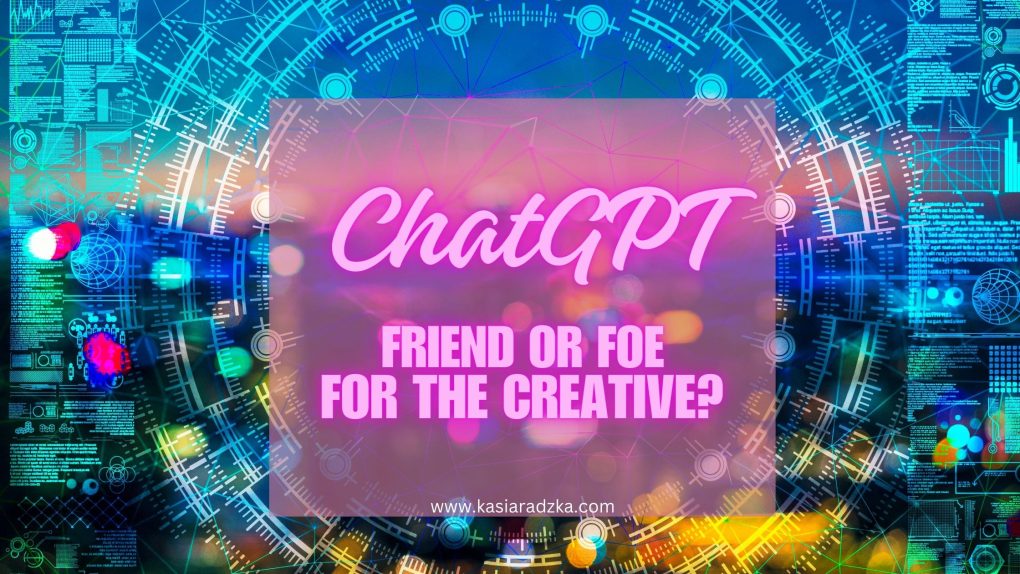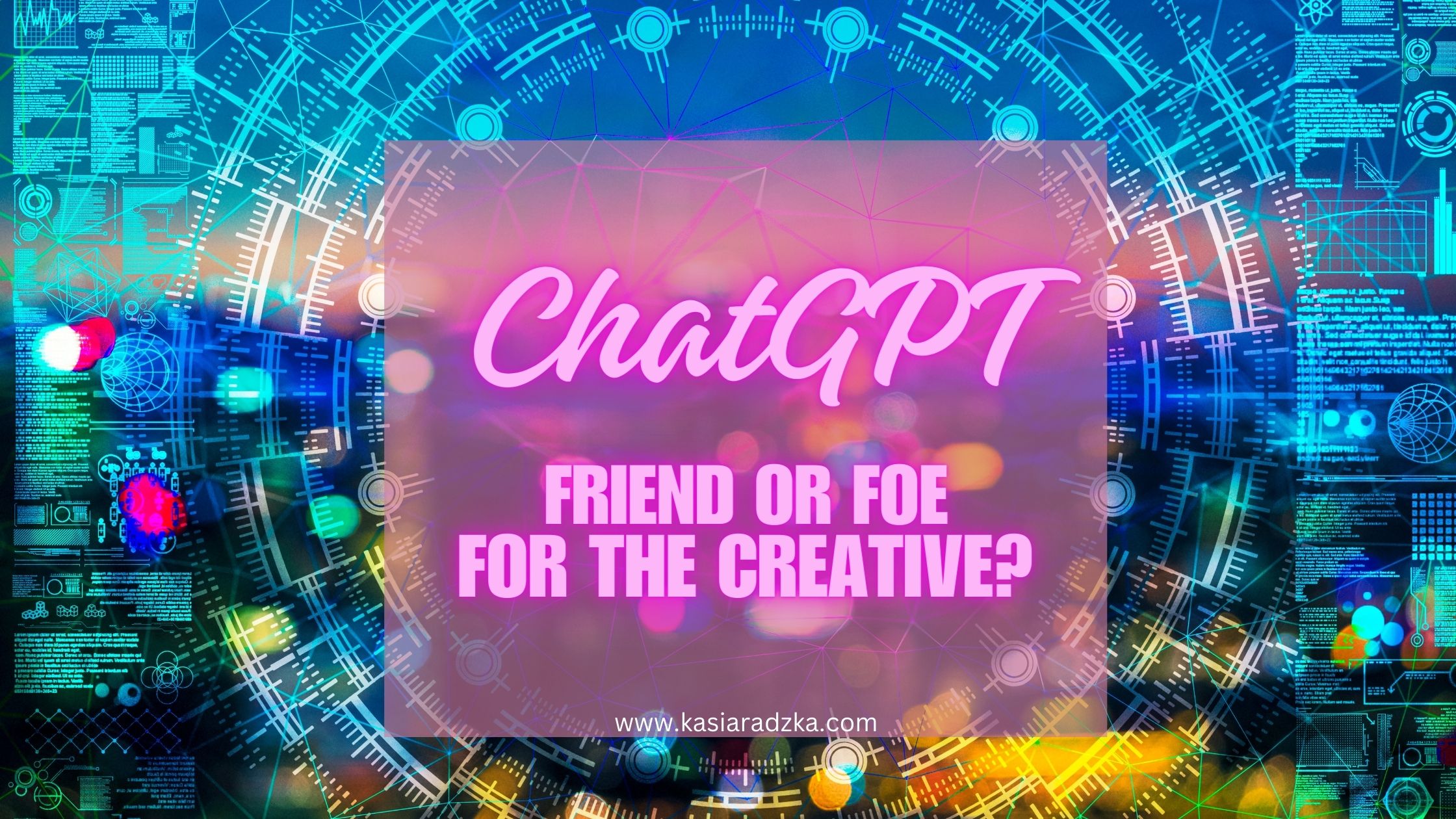I used Chat GPT for the first time today. Yeah, I know, a bit behind the eight-ball.
I’ve been hesitant to say the least. AI scares me. The dangers, the uncertain future, the horror sci-fi scenarios where AI takes over. Okay, yes, these are worst-case/doomsday scenarios – I can’t help it, I’ve seen too many movies.
But then I began to wonder, is it all that bad? Can AI be used for good? Can it bring a different element to our writing and creativity? Can it be used as a tool to enhance our creative pursuits?

As I was reading an article, a link to ChatGPT came up and I succumbed and clicked to find out what all the fuss was about. I didn’t like the idea of signing up for anything I’m unsure about and fortunately I was able to have a play without having to create an account. And oh boy, play I did. Before I knew it, my morning hour by the pool while the kids did swimming was up, and I had to get them off to school and get myself to work.
I discovered that ChatGPT can be like sitting down and having a virtual chat with a friend or colleague, to bounce ideas off and discover additional potential ideas for stories, articles, blog posts and much more.
I’m against the idea of using ChatGPT to write books, articles or blog posts in full. If that tickles you fancy, that’s your choice, but that’s not writing. That’s wanting to be written but not putting in the effort. Using AI to write books is lazy and dishonest, but that’s my personal opinion, and you are entitled to yours.
But using AI for idea generation, brainstorming, and boosting your creativity? Hell yeah!
ChatGPT and Enhancing Your Creativity
Think of it as a group brainstorming session. You’re sitting around with a group of widely knowledgable individuals to play around with story ideas and generate even more ideas to get your own brain swirling with golden nuggets.
When you’re feeling stuck and need that little extra oomph, it works like magic. We’re human so we are limited by the ideas we can come up with, our brains are wired to create from what we already know. Our creativity builds on what we consume – books, movies, art, conversations, news, and everything else in between.
Without consumption, our creativity is limited. With consumption, it’s limitless.
AI adds an extra element, it can provide ideas we didn’t think of because it has access to them, and in the process allow us to build on those ideas to put an original spin on them. That is pretty cool.
The more questions I typed into ChatGPT, the more ideas brewed in my mind. A lot of the things the tool generated were obvious but there were a few nuggets that stirred my own creativity and allowed me to break through the block that was preventing me from moving on to the next section of my book. It triggered ideas that might not have arisen had I not looked at ChatGPT, or it might have taken me longer to reach a story decision or turning point.
Non-writers might think that writing is easy, all you do is sit in front of a computer and write, but it’s actually pretty mentally draining. On top of that, we need to consume in order to create, which is time consuming in itself. Hint, hint: if you think there’s too much art, too many books, too much of anything, you’re mostly wrong. Creativity builds on creativity. We’re not competing against each other. It’s a collaboration of sorts. The world needs people to create, and AI is adding to that collaboration.
What are the dangers of using ChatGPT from a creative perspective?
There are dangers of using AI, and one of them is getting lazy and copying and pasting what the tool regurgitates. You don’t want to do that. I suggest avoiding the ‘copy’ and ‘paste’ option. Instead why not go old school and take notes – yes, pen and paper (it still exists) – and paraphrase, then where necessary ensure you cite your references.
The last thing you want is for AI to take over your writing. You want it to help you come up with ideas that you might not have thought of yourself, to trigger a different train of thought, and maybe take you outside your comfort zone.
Plagiarism is a huge factor. Since the tool draws on all the available works available on the internet, there’s always a risk that it will pull word for word from someone else’s work. While this is still a grey area, it’s assumed that since the tool draws on extensive sources and data, it’s not considered plagiarism per se, however there are many individuals who will argue this.
If you’re using ChatGPT to create, tread with caution. Take notes, avoid copying and pasting, and cite your sources.
Do you have to pay for ChatGPT?
At time of writing, I was able to use the free version of ChatGPT, which apparently is available to everyone. There is a paid version available for $20 per month if you really want to dig deep.
I’m happy experimenting with the free version at this point.
Is ChatGPT safe?
Is anything safe online these days? Has it ever been?
The tool collects data on you. That may include your email, IP address, and the information that you enter into the chat and whether you’re using the free version or paid one. With the advancement of technology and the fact that you’re using an AI tool, then it’s fair to say that it will collect whatever it can on the user. But I’m no tech expert, so don’t take my word for it.
Just be wary, and avoid putting in any personal details into the chat.
Remember, like everything else online – be careful, use common sense, and avoid revealing personal info.
Do you have to disclose the use of AI in your work?
If you decide to use AI in your work you should definitely disclose the information.
For authors, if you’re publishing on Amazon, there is actually a tick-box where you have to confirm whether you have included any AI generated content.
Personally, I think it’s a bad idea to use AI generated content in your books. Use it for brainstorming ideas, but then write stories, blog posts or articles, yourself.
What should creatives use ChatGPT for?
As a creative that is up to you. You have to be comfortable with what you are willing to use AI for.
ChatGPT can be used in positive ways to enhance your creativity or you can allow it to curb it. The choice is yours.
Here are some positive ways to use ChatGPT as a creative:
- Brainstorming story ideas and potential conflicts for your characters
- Coming up with blog post ideas related to your book/subject matter
- Developing scene ideas for your books
- Generating title ideas for your books, stories, blog posts and articles
- Help spark creative ideas that might be outside your usual frame of thinking
- Curate topics for your stories, blog posts, articles, etc
- Have a laugh by asking it silly questions (huge time waster but entertaining)
Remember, ChatGPT should be a tool you use, not a tool that takes over you and your creative endeavours. It can boost creativity, but remember to not rely on it solely. You don’t want to rely on it so much that it actually stifles your natural ability to create.
Get out and about, immerse yourself in books, take a wander through your local art galleries, watch good movies, visit botanical gardens, have conversations with friends, sit in silence, read poetry and news articles, listen to music, go to the opera or a comedy show. All of these things will spark ideas naturally and boost your creativity while adding joy to your life. Using AI, should be at the bottom of the list.


0 Comments